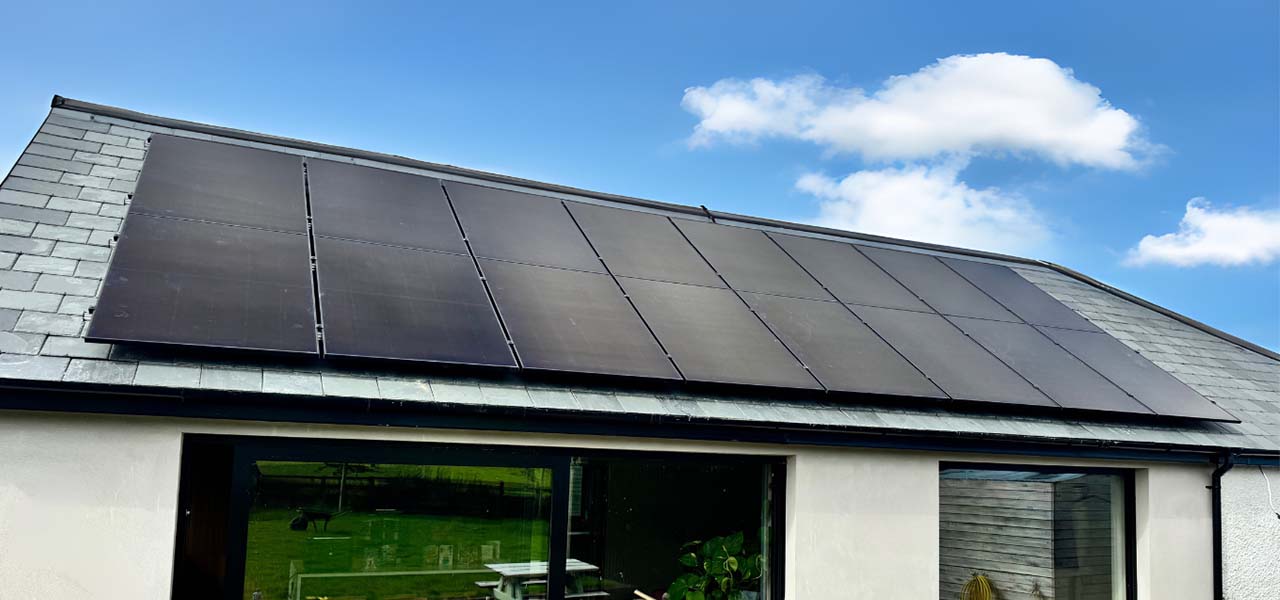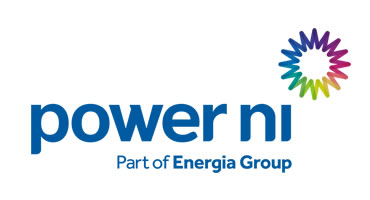Solar panels work by turning sunlight into electricity for your home — all thanks to the clever science of photovoltaic (PV) cells. It’s a simple but powerful way to cut energy bills and reduce your carbon footprint.
More and more homes across Northern Ireland are switching to solar as a reliable, renewable energy source. Here’s everything you need to know to decide if you could benefit from solar power in Northern Ireland.
How do solar panels work?
Solar panels work by converting sunlight into electricity using something called the photovoltaic (PV) effect. The solar panel surface is made up of PV cells that take photons — the small packets of energy that make up sunlight — and turn that energy into electricity.
Here’s a step-by-step look at the process of how solar panels produce electricity:
- The sun gives off light, which travels in the form of tiny energy particles called photons.
- The photons hit the photovoltaic (PV) cells inside your solar panels, creating an electrical charge.
- This creates a Direct Current (DC) — a flow of electricity captured by the solar panel system.
- The inverter converts DC into AC, which is the type of electricity used to power your home.
- The AC electricity flows through your meter and into your home’s consumer unit (fuse box).
- You use the free electricity you’ve generated — and any extra power you don’t use can be sold back to the grid.

-
How much energy do solar panels produce?
The amount of energy produced by solar panels depends on several factors. This includes the capacity of the solar panels, the number of solar panels in the system and the amount of sunlight.
- The average energy output for domestic solar panels is between 250 and 400 watts per hour.
- Most domestic solar panel systems need a capacity of 4kW per hour.
- A three-bedroom house in Northern Ireland will need around 10 solar panels.
- The electricity generated and used is free, so your electricity bills will be lower.
-
How efficient are solar panels in Northern Ireland?
Although solar panels work best and create most electricity in direct sunlight, they are still effective in cloudy and even rainy conditions. Solar panels need only light to generate electricity. It’s only at night that solar panels will stop generating electricity.
The sunlight we get on a cloudy day in Northern Ireland still gets the job done, even if we can’t see blue skies and sunshine. In fact, our rainfall can actually be useful for solar panels. By washing away dust and dirt, rainwater helps solar panels to continue to work effectively.
Top benefits of solar panels
There are many benefits of installing solar panels in Northern Ireland. Some of the key advantages include:
You can save money & earn money
With the right solar panel system, you’ll be able to generate most or all of your own electricity. This will cut your energy bills massively, especially if you consider just how much you spend on electricity annually.
You can also earn money by selling electricity from your solar panels on days when they generate more than you need.You’ll reduce your carbon emissions
Solar power is a form of green, clean and renewable energy. Switching to solar energy will dramatically reduce your carbon footprint.
In fact, having solar panels on your roof is estimated to save one tonne of carbon dioxide emissions every single year.They work in all seasons
Solar panels work efficiently all year round. They need sunlight, not heat. Although they will generate more electricity in the direct sunlight and long daylight hours of summer, solar panels still generate plenty of electricity on a cold winter’s day.
Around 20% of the electricity from a typical solar installation will be generated between October and February.Your property value will likely increase
All of the benefits we’ve mentioned so far — especially the opportunities to generate money, reduce your carbon footprint and have greater energy efficiency — can make a property highly sought-after.
As a result, installing solar panels may increase the value of your home.
Key considerations before installing solar panels
Solar panels are a big investment so it’s important to give everything careful consideration before going ahead.

Roof size & sun direction
Most homes need around 20m² of roof space for a standard 10-panel system. That’s usually enough to cover most of the electricity needs for a three-bedroom home. If your roof is too small or not strong enough to support the number of panels you need, solar power might not be the right fit.
South-facing roofs give the best results, especially in coastal areas. East- and west-facing roofs can still work well but may generate around 15–20% less electricity. North-facing roofs aren't ideal, and shade from trees, chimneys or neighbouring buildings can also reduce output.
Permission & regulations
In most cases, you don't need planning permission to install solar panels in Northern Ireland. However, if you live in a listed building or a conservation area, it’s best to check with your local authority's planning office before installing.
All solar systems must meet the Engineering Recommendation EREC G98/NI standard. Your installer will register your setup with NIE Networks. Once confirmed, you can register with us to start exporting any extra electricity you generate.
Up front and ongoing costs
Installing solar panels in Northern Ireland usually costs between £4,000 and £9,000, depending on the size of your system. For an average three-bedroom home, a 10-panel system costs around £7,800, based on the current price of £780 per 350-watt panel. There are no domestic grants currently available in NI.
But solar panels require very little upkeep. Optional extras like pigeon-proofing typically cost between £600 and £1,000. According to the Energy Saving Trust, a home in Belfast could save between £95 and £375 per year on electricity, with the potential to earn even more by selling unused electricity back to the grid.
Choosing the right type of solar panel
Once you’ve decided that solar power could be a good fit for your home, the next step is choosing the right type of panel.
There are three main types commonly used in Northern Ireland - Monocrystalline, Polycrystalline and Thin Film.
| Monocrystalline Solar Panels | Polycyrstalline Solar Panels | Thin Film Solar Panels | |
|---|---|---|---|
| Appearance: | Black and uniform appearance | Blue and marbled appearance | Clean black appearance, which sit flat against roofs |
| Material: | Silicon | Silicon | Glass or layers of photovoltaic (PV) materials |
| Commonly used: | Suitable for all types of installations — the most common type of solar panel | Suitable for low-cost residential installations | Suitable for awkward spaces or buildings, where thicker solar panels not appropriate |
| Pros: | This is the most efficient solar panel type, with the most subtle and consistent appearance | This solar panel is more affordable compared to monocrystalline, and is also less wasteful to make | This panel is unobtrusive, with a clean design and has the lowest installation costs |
| Cons: | These panels have white space around individual cells and have a high cost | These panels generate less electricity, and can have an inconsistent/conspicuous appearance | These panels have the lowest performance and shortest lifespan |
Choosing the right type of solar panel will depend on your budget, your roof space, and how much energy you want to generate. If you’re not sure where to start, we can help you get expert advice for your home.
Install solar panels with us
If you're thinking about installing solar panels, we can help. We offer expert advice to guide you through the process and connect you with trusted, accredited installers in Northern Ireland. Whether you're just exploring your options or ready to take the next step, our team is here to make your move to solar power simple and stress-free.
Find out how to get started
Solar Panel FAQs
Before you move ahead with solar panels, it helps to know a few simple ways to get the best from your system. Here are some common questions and tips to help you maximise your savings and performance.
-
When’s the best time to use electricity from my solar panels?
Try to run your appliances during daylight hours, when solar panels are generating free electricity. You can set timers on your washing machine, dishwasher and other energy-hungry appliances so their cycles run during the day.
That way, you’ll avoid needing to draw electricity from the grid in the evenings when your solar output drops. -
Can I use multiple appliances at the same time?
When using solar power, it's better to stagger appliance use throughout the day. Running several heavy appliances at once can create more demand than your panels are generating, meaning you’ll pull extra (and chargeable) electricity from the grid.
Where possible, set appliances to run one after the other to stay within your system’s daytime output. -
What are PV diverters and battery storage systems — and should I get one?
A PV diverter sends any surplus electricity your panels generate to your immersion heater — giving you free hot water rather than sending that energy back to the grid. Installing a PV diverter usually adds around £800 to your system cost.
A solar battery is another option. It stores unused solar electricity during the day so you can use it at night. Batteries cost more upfront, but they can dramatically reduce the amount of energy you buy from the grid. -
How can shading affect my solar panels, and what can I do about it?
Shading can reduce the amount of electricity your panels generate.You can improve performance by trimming back trees or plants that block sunlight.
If shade is unavoidable, installing micro-inverters can help. They allow each panel to work independently — so shading on one won’t drag down the performance of the others. -
Will upgrading my appliances help me make better use of solar power?
Yes, absolutely! Switching to energy-efficient appliances (like A-rated washing machines and LED lighting) reduces the amount of electricity you need. That means your solar panels can cover a larger share of your total use, boosting your savings.
-
Is there a way to monitor my solar panels and energy use?
Yes — monitoring your system helps you understand how much energy you’re generating and using.
You can track your usage through the free Sunsynk app, and some solar panels also come with their own monitoring apps. Real-time data helps you adjust your habits and get the best return from your solar investment.
Learn more about renewable energy
Sell your excess energy with us
You can sell it back your excess energy to the grid and earn regular payments with our Microgen tariff. Our rates are approved by the Utility Regulator, and you'll have access to a dedicated online account to manage your readings and track payments.
Find out how it works
Written by: Power NI Energy Experts


